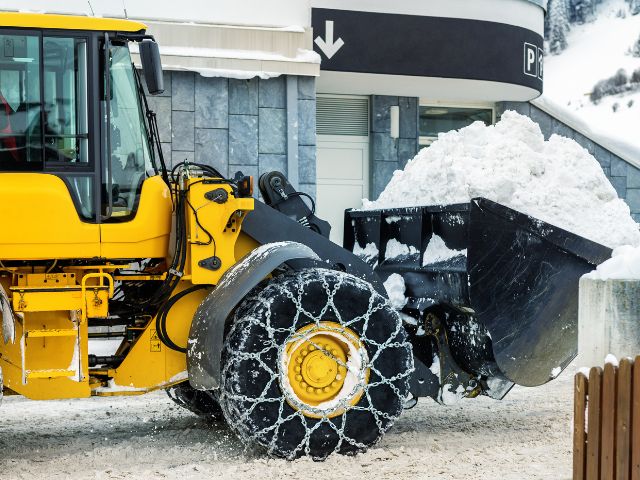

Winter can be a challenging time for heavy equipment operators and maintenance crews. As temperatures drop and harsh weather conditions set in, you must ensure your heavy equipment is in good shape to prevent costly repairs and downtimes.
To help you protect your tools and machinery, let’s look at how to prepare your equipment for the winter.
Before the winter season begins, you should examine your heavy equipment for any existing damage or potential issues thoroughly. Carefully inspect every part of the machine, including the hydraulic systems, electrical components, and moving parts.
Ensure there are no visible cracks, leaks, or signs of wear and tear. A detailed inspection will help you identify and address potential problems before they escalate and cause significant downtime during the critical winter months.
As temperatures decrease, the properties of your heavy equipment fluids can change, potentially affecting their performance. To ensure the optimal operation of your machinery, consider switching to winter-grade lubricants designed explicitly for low temperatures.
These lubricants provide better viscosity and flow at lower temperatures, enhancing the performance and longevity of your heavy equipment. Additionally, don’t forget to check the coolant level and keep it balanced to prevent freezing in the engine.
Corrosion is a significant problem that can affect the integrity and functionality of your heavy equipment. One of the best ways to prevent equipment corrosion on a jobsite is to invest in a high-quality, heavy equipment storage solution. Examples include a heated garage or fabric storage building. Keeping your heavy equipment indoors offers added protection against the elements, which can help slow down the corrosion process. If indoor storage isn’t feasible, use protective covers to shield your equipment from snow, ice, and salt.
Additionally, you should keep your heavy equipment clean throughout the winter months, washing off dirt, debris, and harmful road chemicals, such as salts and deicers. Applying corrosion inhibitors and anti-corrosion coatings to exposed metal components can also provide an added layer of protection.
Tire performance directly affects your heavy equipment’s efficiency, safety, and overall performance. During the winter months, you must take special care of your tires—or implement a tire management plan—to help improve safety and overall performance.
Regularly inspect tires for pressure, tread depth, and signs of damage. Additionally, consider opting for winter-specific or all-season tires to provide better traction and stability in cold weather conditions.
Preparing your heavy equipment for winter isn’t complete without ensuring your operators have the training to handle the machinery in harsh weather conditions. Provide training on safe driving techniques and operating procedures in snow and ice.
Make sure they understand how to identify potential safety hazards and respond accordingly. Educating your operators on proper equipment maintenance can also help them identify potential issues before they become significant problems.
Preparing your heavy equipment for winter is crucial to ensure optimal performance and prevent costly breakdowns during the cold season. By following these five key steps, you can ensure your machinery is ready to tackle whatever challenges the winter season may bring. Prevention is always better than dealing with unexpected repairs and downtimes during crucial times of the year.
24World Media does not take any responsibility of the information you see on this page. The content this page contains is from independent third-party content provider. If you have any concerns regarding the content, please free to write us here: contact@24worldmedia.com

A Brief Look at the History of Telematics and Vehicles

Tips for Helping Your Students Learn More Efficiently

How To Diagnose Common Diesel Engine Problems Like a Pro

4 Common Myths About Wildland Firefighting Debunked

Is It Possible To Modernize Off-Grid Living?

4 Advantages of Owning Your Own Dump Truck

5 Characteristics of Truth and Consequences in NM

How To Make Your Wedding More Accessible

Ensure Large-Format Printing Success With These Tips

4 Reasons To Consider an Artificial Lawn

The Importance of Industrial Bearings in Manufacturing

5 Tips for Getting Your First Product Out the Door